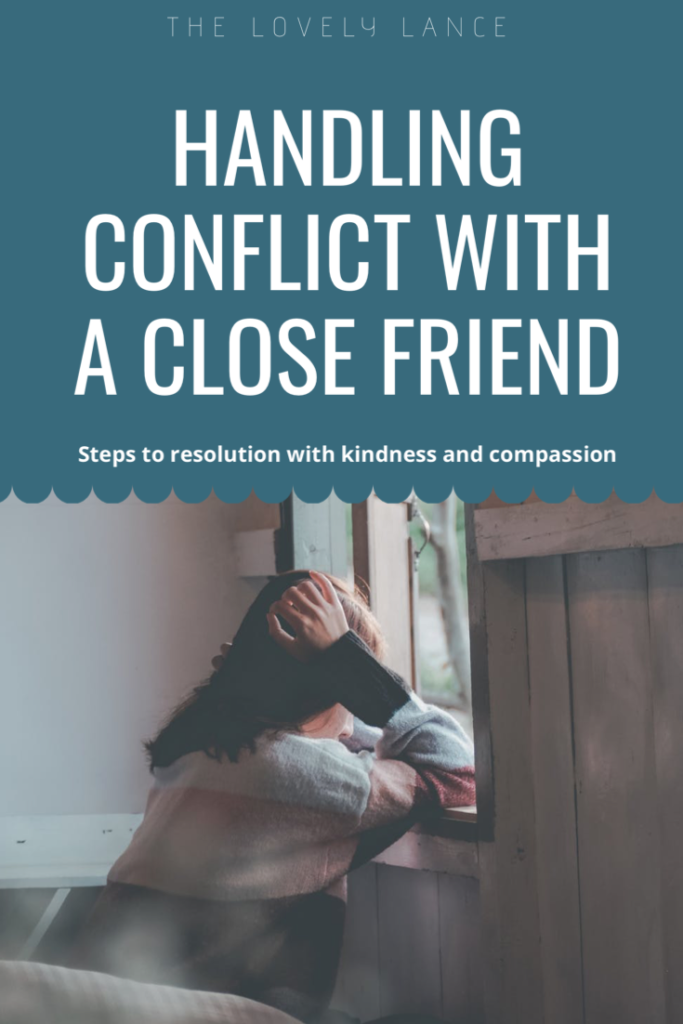How to: Confront a friend with compassion

As a 27 year old woman, I’ve had a variety of different friendships and relationships over the years and no two are the same. Sometimes, you have friends who you just click with while other relationships take serious effort and time commitment. One thing I’ve always found difficult, no matter what type of friend I’m dealing with, is how to confront them with kindness and respect when I’m feeling shortchanged or hurt.
While confrontation feels like a recipe for disaster, sharing concerns with our friends can actually improve relationships. Holding back feelings, whether it be anger or sadness, can cause more detriment than good- to any relationship! Below, I’ve listed the steps that I’ve found have always worked when needing to have a serious conversation with a friend.
Step 1: Ask yourself, “Are my feelings valid about this particular issue?”
Before you say “Wait! Our feelings are always valid!”, let me address this: yes, our feelings ARE always valid! However, sometimes it’s easy to get wrapped up in our own emotions without looking at the issue from all angles. A great way to decide if your current emotions are worth discussing is to run them by an innocent 3rd party: a family member that doesn’t really know your friend that well or a non-mutual friend. I’ve definitely found in the past that some things that have initially hurt my feelings haven’t actually been as important as I’ve made them out to be in my head.
Step 2: Consider the other person’s current life or state of mind
Is this friend going through the death of a loved one, a significant break up, or a job loss? These events certainly don’t excuse rude or hurtful behavior, but sometimes they can help justify a person’s actions. During one of my worst breakups, I became a very bitter, jealous friend. I didn’t want to actively see my friends in relationships, I wanted them to be sad with me. Did I actually act upon these thoughts or feelings? Of course not, but I know in hindsight that I wasn’t the best type of friend during that point in my life. Sometimes, it’s best to act with grace.
Step 3: Identify the root of the conflict
If you’re still reading by this step, than you probably do need to have a conversation with your friend. Before we get to that step, you need to identify the exact root of the emotions you’re feeling. For example, my friend Erin recently got very intoxicated at a party we mutually attended. She ended up accusing me of stealing her car keys, which I didn’t, and made a big scene in front of everyone about how I was a liar and trying to prevent her from having a good night elsewhere. Initially, I was angry because I was very embarrassed. However, upon feeling like we needed to address this issue, I realized I was more upset with the fact that I never got an apology from the situation. Looking back, I understood that she was drunk, angry, and probably didn’t realize how much of a scene she caused, however, she never made an effort to address the mistake she made.
Step 4: Decide how to approach the confrontation
Ideally, a confrontation should take place in person, in a somewhat private location like a friend’s house or a public park. Many times, confrontations can be emotional or very personal and nobody wants to deal with that, say in a crowded Starbucks. I know it feels easiest to try to address a conflict through texting or phone calls, but it so easy to get emotions misconstrued when you aren’t face to face…I know…worst news ever. With my situation, I texted Erin after a week or so explaining that I was upset with the actions that had unfolded over the past weekend and that I wanted to discuss it more in person.
Step 5: Plan out the conversation ahead of the confrontation
Emotions are tricky, and under stress we can be led to say things we later regret. When having a serious discussion, it’s vitally important to plan out ahead of time exactly what you want to convey to your friend. You also want to be sure that you are being genuine- sarcasm, blame, and criticism don’t belong in this conversation! Actions such as these are classic defense mechanisms, especially if the conversation isn’t going how you expected to. Finally, be prepared to use “ I Statements”. Although you’re likely having this conversation as the result of the actions/behaviors of a friend, it’s important to convey your emotions and your experiences. When using “I Statements”, you’ll lessen the potential of laying blame on your friend.
Step 7: Have the difficult conversation
The part you’ve prepared for: actually having the conversation. For me, it was easiest to start lightly and ask how Erin had been doing lately. We had a brief conversation about both of our lives lately, then I started by bringing up that dreadful weekend. In order to be prepared, I had made a list of feelings and “I Statements” that I wanted to bring up so that I wouldn’t fall into those defense mechanisms. Although this initially felt silly, it did end up being helpful.
Step 8: Acceptance of the confrontation
Unfortunately, not every friendship is built to last. With these serious conversations, it’s easy for a friend to feel criticized even when we best prepare to confront with kindness and compassion. If your friend doesn’t respond as you may have hoped, your main job is to make sure you relayed your feelings. Sometimes, it might take time for the conversation to settle between you and your friend before the air clears. Remember- It’s not your place, ever, to control somebody else’s feelings.
Have you had a successful confrontation with a friend who had upset you? Let me know in the comments below.
Leave a Reply